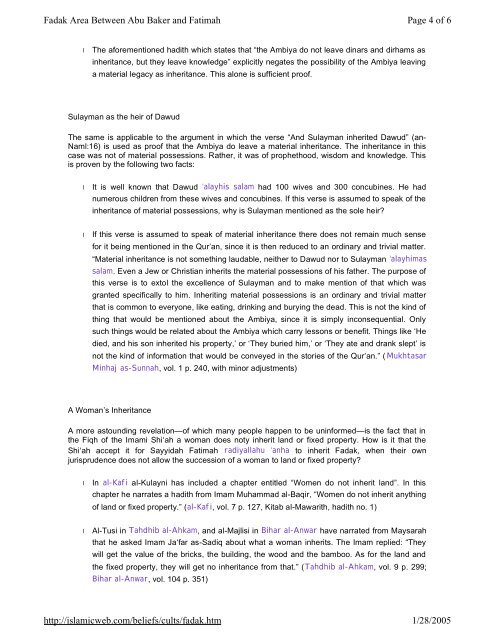Collection Of Articles (Refuting Shia) - Enjoy Islam
Collection Of Articles (Refuting Shia) - Enjoy Islam
Collection Of Articles (Refuting Shia) - Enjoy Islam
Create successful ePaper yourself
Turn your PDF publications into a flip-book with our unique Google optimized e-Paper software.
Fadak Area Between Abu Baker and Fatimah<br />
Page 4 of 6<br />
• The aforementioned hadith which states that “the Ambiya do not leave dinars and dirhams as<br />
inheritance, but they leave knowledge” explicitly negates the possibility of the Ambiya leaving<br />
a material legacy as inheritance. This alone is sufficient proof.<br />
Sulayman as the heir of Dawud<br />
The same is applicable to the argument in which the verse “And Sulayman inherited Dawud” (an-<br />
Naml:16) is used as proof that the Ambiya do leave a material inheritance. The inheritance in this<br />
case was not of material possessions. Rather, it was of prophethood, wisdom and knowledge. This<br />
is proven by the following two facts:<br />
• It is well known that Dawud ‘alayhis salam had 100 wives and 300 concubines. He had<br />
numerous children from these wives and concubines. If this verse is assumed to speak of the<br />
inheritance of material possessions, why is Sulayman mentioned as the sole heir<br />
• If this verse is assumed to speak of material inheritance there does not remain much sense<br />
for it being mentioned in the Qur’an, since it is then reduced to an ordinary and trivial matter.<br />
“Material inheritance is not something laudable, neither to Dawud nor to Sulayman ‘alayhimas<br />
salam. Even a Jew or Christian inherits the material possessions of his father. The purpose of<br />
this verse is to extol the excellence of Sulayman and to make mention of that which was<br />
granted specifically to him. Inheriting material possessions is an ordinary and trivial matter<br />
that is common to everyone, like eating, drinking and burying the dead. This is not the kind of<br />
thing that would be mentioned about the Ambiya, since it is simply inconsequential. Only<br />
such things would be related about the Ambiya which carry lessons or benefit. Things like ‘He<br />
died, and his son inherited his property,’ or ‘They buried him,’ or ‘They ate and drank slept’ is<br />
not the kind of information that would be conveyed in the stories of the Qur’an.” (Mukhtasar<br />
Minhaj as-Sunnah, vol. 1 p. 240, with minor adjustments)<br />
A Woman’s Inheritance<br />
A more astounding revelation—of which many people happen to be uninformed—is the fact that in<br />
the Fiqh of the Imami Shi‘ah a woman does noty inherit land or fixed property. How is it that the<br />
Shi‘ah accept it for Sayyidah Fatimah radiyallahu ‘anha to inherit Fadak, when their own<br />
jurisprudence does not allow the succession of a woman to land or fixed property<br />
• In al-Kafi al-Kulayni has included a chapter entitled “Women do not inherit land”. In this<br />
chapter he narrates a hadith from Imam Muhammad al-Baqir, “Women do not inherit anything<br />
of land or fixed property.” (al-Kafi, vol. 7 p. 127, Kitab al-Mawarith, hadith no. 1)<br />
• Al-Tusi in Tahdhib al-Ahkam, and al-Majlisi in Bihar al-Anwar have narrated from Maysarah<br />
that he asked Imam Ja‘far as-Sadiq about what a woman inherits. The Imam replied: “They<br />
will get the value of the bricks, the building, the wood and the bamboo. As for the land and<br />
the fixed property, they will get no inheritance from that.” (Tahdhib al-Ahkam, vol. 9 p. 299;<br />
Bihar al-Anwar, vol. 104 p. 351)<br />
http://islamicweb.com/beliefs/cults/fadak.htm<br />
1/28/2005
















